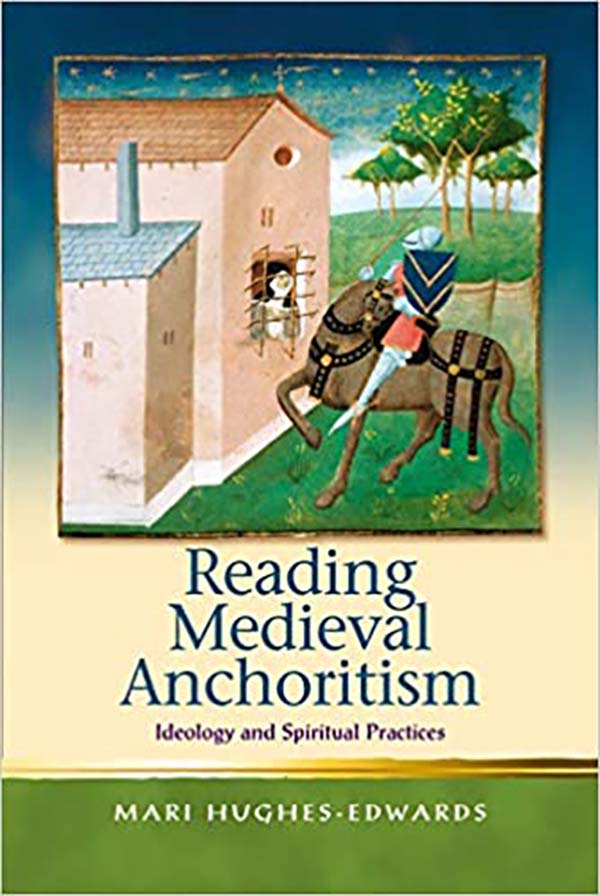Reading Medieval Anchoritism
Ideology and Spiritual Practices
Author(s) Mari Hughes-Edwards
Language: English
Genre(s): History
Series: Religion and Culture in the Middle Ages
- December 2011 · 256 pages ·234x156mm
- · Hardback - 9780708325049
- · Paperback - 9780708325056
- · eBook - pdf - 9780708325063
- · eBook - epub - 9781783165155
Medieval anchorites willingly embraced the most extreme form of solitude known to the medieval world, so they might forge a closer connection with God. Yet to be physically enclosed within the same four walls for life required strength far beyond most medieval Christians. This book explores the English anchoritic guides which were written, revised and translated, throughout the Middle Ages, to enable recluses to come to terms with the enormity of their choices. The book explores five centuries of the guides' negotiations of four anchoritic ideals: enclosure, solitude, chastity and orthodoxy, and of two vital anchoritic spiritual practices: asceticism and contemplative experience. It explodes the myth of the anchorhold as solitary death-cell, revealing it as the site of potential intellectual exchange and spiritual growth.
'In this impressive study, Dr. Hughes-Edwards writes a new history of medieval English anchoritism that rivals the work of Warren's landmark 'Anchorites and their Patrons in Medieval England'. She traces, patiently and sensitively, the evolution of four centuries of anchoritic ideology, placing it in the context of a wide range of rarely considered, but remarkably innovative, theological texts. The results are profound and surprising. No scholar of medieval anchoritism or indeed the history of medieval asceticism can afford to ignore this book'. Professor Robert J. Hasenfratz, University of Connecticut 'Mari Hughes-Edwards's 'Reading Medieval Anchoritism' is comprehensive, systematic and thorough. The first study to trace anchoritic ideology over four centuries, it shows that the goal of the anchorite was not extreme suffering and privation but heightened contemplative experience. It amasses important evidence that anchorites had a range of acceptable social functions and modifies scholarship's current, fundamental, image of anchoritic enclosure as merely social death.' Professor Derek Pearsall, University of York 'Mari Hughes-Edwards's 'Reading Medieval Anchoritism' is a thoughtful and well-researched study that will be of interest to all those working on the English anchoritic tradition'. Professor Bella Millett, University of Southampton
Introduction The Origins of Anchoritism Introduction to Medieval Anchoritism Introduction to the Anchoritic Guidance Writing Genre PART ONE: ANCHORITIC SPIRITUALITY IN ISOLATION: THE ENGLISH ANCHORITIC GUIDES Chapter One: Introducing the Guides The Earlier-Medieval Guides The Later-Medieval Guides Chapter Two: Anchoritic Enclosure Permanent Fixity of Place The Purpose of Anchoritic Enclosure Anchoritic Enclosure and Living Death The Invisible Anchorhold Safeguarding Anchoritic Enclosure Chapter Three: Anchoritic Solitude and Sociability The Idealisation of Solitude Qualifying Solitude: Acceptable Anchoritic Interaction Safeguarding Solitude: Demonising Anchoritic Sociability Anchoritic Sociability and Chastity PART TWO: ANCHORITIC SPIRITUALITY IN CONTEXT: ENGLISH ANCHORITISM AND THE WIDER MEDIEVAL WORLD Chapter Four: Anchoritism and Asceticism The History of Asceticism Anchoritism and Earlier-Medieval Asceticism: Waging Ascetical War Anchoritism and Ascetical Discretion Anchoritism and Later-Medieval Asceticism: Sin-Hatred not Flesh-Hatred Purity without Pain: Ascetical Meditation Chapter Five: Anchoritism and Contemplative Experience The Vocabulary of Contemplation The Three Stages of Contemplation: Meditation, Vision, Fusion Anchoritic Contemplation and the Active/Contemplative Debate Anchoritic Contemplation and Contemplative Orthodoxy


